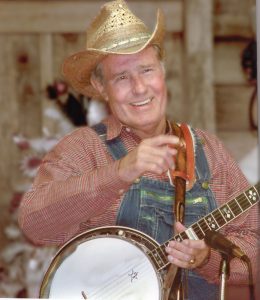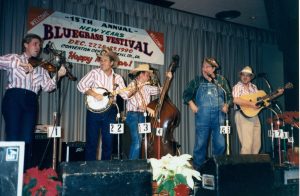Charlie Daniels remembers the Ragged Old Flag

I was standing off stage as a long list of stars were called out and introduced by Country Music legend Charlie Daniels awaiting my name to ring out from the mouth of the man who told the story of Johnny beating the old devil in the fiddling showdown.
It was especially an honor for me to stand in front of those attending playing my fiddle as he backed me on guitar. Few musical performers epitomize the American spirit with more passion and fervor than the now Country Music Hall of Fame member.
The singer, who has sung of his unabashed patriotism time in and time out during his career, is showcasing his love of the Red, White, and Blue once again in his latest recording that will be available for sale digitally on July 4th via iTunes, Amazon, Google Play among other digital platforms.
It was my old friend and supporter Johnny Cash who made “Ragged Old Flag” a standard. Written and recorded by “The Man in Black,” the song hit No. 31 on the Billboard Country Singles chart in 1974.
Daniels recorded a stirring version of the song which still garners airplay during the summer months on Classic Country stations nationwide, particularly around the Fourth of July. Recording this song allowed Charlie to combine two of his biggest passions – his country and his love of Johnny Cash. Charlie is joined on this track by Mark “Oz” Geist, Benghazi Warrior/Survivor and co-author of “13 Hours: The Inside Account of What Really Happened in Benghazi.”
“These lyrics are just as timely today as they were when Johnny originally recorded them over four decades ago,” Daniels said. “The song demonstrates the passion and the love that we all should have for this country – and the freedoms that we enjoy with it. Of course, it is always a joy to record a song written by the great Johnny Cash. He was an American original, and someone that I consider myself humbled and honored to call friend. Good songs, such as his, continue to remain in style.”
The Grand Ole Opry star, turned 80 last fall but he is not slowing down in the slightest. He continues to tour across the country, and will release a new book, Never Look At The Empty Seats on October 24. The book will document his legendary career, as well as several of his many trips abroad in support of the United States Military.
With a career spanning nearly 60 years and exceeding 20 million in sales worldwide Charlie Daniels is the quintessential southerner with a healthy dose of wild west cowboy. For decades, he has connected with his millions of fans in the varying genres of music that reflect his steadfast refusal to label his music as anything other than the “Charlie Daniels Band” sound — music that is now sung around the fire at 4-H Club and scout camps, helped elect an American President, and been popularized on a variety of radio formats. Having celebrated multiple GRAMMY® Awards, CMA Awards, ACM Awards, BMI Awards, GMA Dove Awards, CCMA Awards, his list of accolades is broad; the latest being the newest inductee to the Country Music Hall of Fame.
Several of his albums have been RIAA Certified Multi-Platinum® and he has achieved a platinum-selling single in his iconic fiddle-ridden hit, “Devil Went Down to Georgia.” An outspoken American patriot and strong supporter of the U.S. military, his talked-about Volunteer Jam concerts are world-famous musical extravaganzas featuring artists like Lynyrd Skynyrd, Ted Nugent, Trace Adkins, Alabama and others, all on one stage for one purpose – to raise funds for our U.S. military. Daniels 80th Birthday Volunteer Jam in 2016 raised funds for The Journey Home Project, a non-profit veterans’ assistance organization which he co-founded. For more information on Charlie Daniels, please visit www.charliedaniels.com.


 Outside of Nashville’s historic Ryman Auditorium, country and bluegrass legend Ricky Skaggs unveiled a newly installed life-size bronze statue dedicated to his musical mentor, Bill Monroe.
Outside of Nashville’s historic Ryman Auditorium, country and bluegrass legend Ricky Skaggs unveiled a newly installed life-size bronze statue dedicated to his musical mentor, Bill Monroe. the Blue Grass Boys, named for Monroe’s home state of Kentucky.
the Blue Grass Boys, named for Monroe’s home state of Kentucky. Dickens recorded many novelty songs including “Country Boy,” “A-Sleeping at the Foot of the Bed,” “I’m Little but I’m Loud,” and his biggest hit, the No. 1 “May the Bird of Paradise Fly Up Your Nose.” His song “Take an Old Cold Tater (And Wait)” inspired Hank Williams to nickname him Tater.
Dickens recorded many novelty songs including “Country Boy,” “A-Sleeping at the Foot of the Bed,” “I’m Little but I’m Loud,” and his biggest hit, the No. 1 “May the Bird of Paradise Fly Up Your Nose.” His song “Take an Old Cold Tater (And Wait)” inspired Hank Williams to nickname him Tater.
 April 2017 interview that he is amazed where his banjo took him.
April 2017 interview that he is amazed where his banjo took him. James Watson (second from left) appears on stage with the Golden River Grass from left, Randall Franks, Gene Daniell, Doodle Thrower and Wesley Clackum in 1990 at the Jekyll Island Bluegrass Festival in Georgia. (Courtesy Randall Franks Media: Ronald Stuckey)
James Watson (second from left) appears on stage with the Golden River Grass from left, Randall Franks, Gene Daniell, Doodle Thrower and Wesley Clackum in 1990 at the Jekyll Island Bluegrass Festival in Georgia. (Courtesy Randall Franks Media: Ronald Stuckey) “I’ve always loved singing with Daryle Singletary. He’s one of the greatest singers in this generation of country music,” said Vincent. “It’s so fun to sing with someone who challenges me as a singer. The songs were given great thought, along with one that was totally unexpected. It’s one of the best projects I’ve ever been part of. I am so proud of this recording, and I cannot wait for the world to hear our wonderful creation,
“I’ve always loved singing with Daryle Singletary. He’s one of the greatest singers in this generation of country music,” said Vincent. “It’s so fun to sing with someone who challenges me as a singer. The songs were given great thought, along with one that was totally unexpected. It’s one of the best projects I’ve ever been part of. I am so proud of this recording, and I cannot wait for the world to hear our wonderful creation,